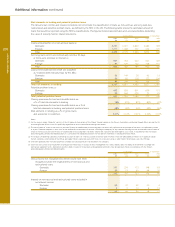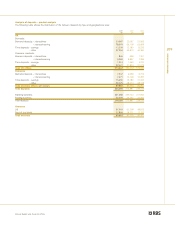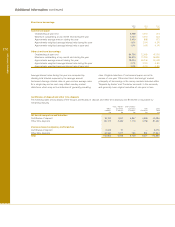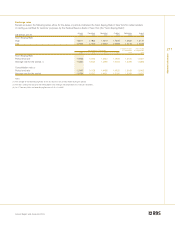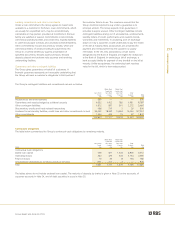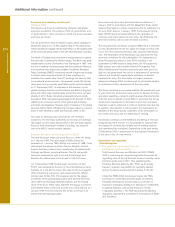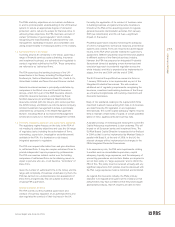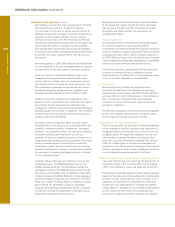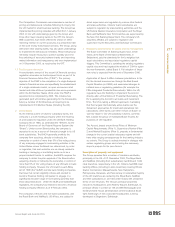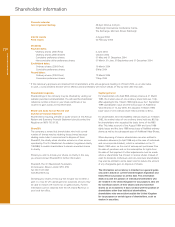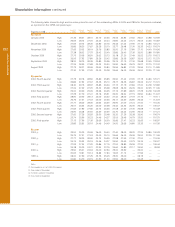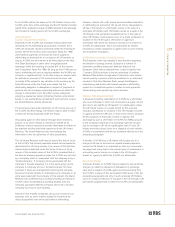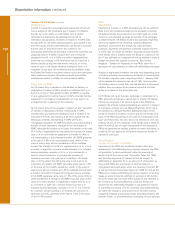RBS 2003 Annual Report Download - page 218
Download and view the complete annual report
Please find page 218 of the 2003 RBS annual report below. You can navigate through the pages in the report by either clicking on the pages listed below, or by using the keyword search tool below to find specific information within the annual report.
216
Additional information continued
Additional information
Supervision and regulation (continued)
their liabilities and that they treat customers fairly. The FSA
sets requirements relating to “margins of solvency”
(i.e. the excess of the value of assets over the amount of
liabilities). Companies carrying out insurance business are
required to submit regular statistical returns covering
reserves and solvency, to the FSA. Recently, the FSA has
decided that fundamental changes need to be made to the
way in which this sector is regulated. Certain changes
have already been introduced to the prudential regulation
of insurers but the FSA is considering further improvements
to increase the capital requirements of both life and non-
life insurers.
From the beginning of 2005, FSA’s remit will also be extended
to cover regulation of the sale and administration of general
insurance and certain other types of insurance contracts.
Firms must also meet standards relating to their senior
management arrangements and internal systems and
controls and must comply with rules designed to reduce
the scope for firms to be used for money laundering. The
FSA continues to supervise compliance with anti-money
laundering obligations closely and new legislation and
amended rules are scheduled to come into force in 2004.
Conduct of business standards essentially govern key
aspects of firms’ relationships with customers, and require
the provision of clear and adequate information, the
managing of conflicts of interest and the recommending of
products suitable to the needs of customers. The marketing
of financial products (particularly investment products) is
subject to detailed requirements.
The FSA’s Conduct of Business Rules currently require
authorised firms in the Group such as the Royal Bank and
NatWest to determine whether to market the “packaged
products” (i.e. personal pensions, life assurance, collective
investment schemes and investment trust savings
schemes) of only one company or group, or to become an
independent intermediary, providing customers with advice
across a broader range of products (this is called the
“polarisation regime” and was introduced as a consumer
protection mechanism). A group of persons allied together
for purposes of marketing packaged products is referred
to as a “marketing group”.
Currently, Group companies are members of one of two
marketing groups – The RBS Marketing Group or the
NatWest Marketing Group. The Royal Bank markets the
packaged products of the RBS Marketing Group through
its branches and NatWest (and its subsidiary, Ulster Bank
Limited) markets the NatWest Marketing Group packaged
products through its branches and, at present, under the
FSA’s rules, neither The Royal Bank nor NatWest (or Ulster
Bank Limited) are permitted to advise on packaged
products more generally. Independent advice is available
to customers through the Royal Bank of Scotland Group
Independent Financial Services Limited.
Recognising both the substantial anti–competitive effects
of the polarisation regime and the fact that it generates
little consumer benefits, the FSA has decided to abolish
this regime and these changes are expected to be
implemented in 2004.
Focus on customers
An important element of securing an appropriate degree
of consumer protection is ensuring that suitable
arrangements are made for dealing with customer complaints.
Firms are required to establish appropriate internal complaint
handling procedures and to report complaints statistics to
the FSA. Where an issue cannot be resolved by the parties
it may be referred for independent assessment to a complaints
scheme run by the Financial Ombudsman Service.
The Financial Services Compensation Scheme (financed
by levies on authorised firms) is available to provide
compensation up to certain limits if a firm collapses owing
money to investors, depositors or policyholders.
1.4 Enforcement
Where appropriate, the FSA may discipline and/or
prosecute for breaches of the legislative or regulatory
requirements. It works closely with the criminal authorities
and uses both civil and criminal powers. It can withdraw a
firm’s authorisation, discipline firms and individuals,
prosecute for various offences and require funds to be
returned to customers.
The FSA also has powers under certain consumer legislation
to take action against authorised firms to address unfair
terms in financial services consumer contracts.
1.5 Extension of the FSA’s responsibilities
From 31 October 2004, the scope of the FSA’s responsibilities
will be widened to cover the regulation and supervision of
mortgage lending and administration and the provision of
mortgage advice. Arrangements relating to the sale and
administration of general insurance (and certain other
insurance) contracts will become regulated from January
2005. All of these types of activities are undertaken by
companies in the Group and this extension of the scope of
statutory regulation is likely to have a significant impact on
how the relevant businesses operate in the future.
1.6.Other relevant UK agencies and Government departments
Consumer credit issues are covered by the Department of
Trade and Industry (”DTI“) and the Office of Fair Trading
(“OFT”) and competition issues are dealt with by the OFT.
The business of granting consumer credit is heavily regulated.
Aspects of the consumer credit business are currently being
reviewed, at both national and EU levels. Changes to UK
legislation are expected to be implemented in late 2004.
The DTI also has responsibility for company law matters.
Various aspects of company law are currently being reviewed,
at both national and EU levels. Some proposals have
already been adopted and further changes are expected.




